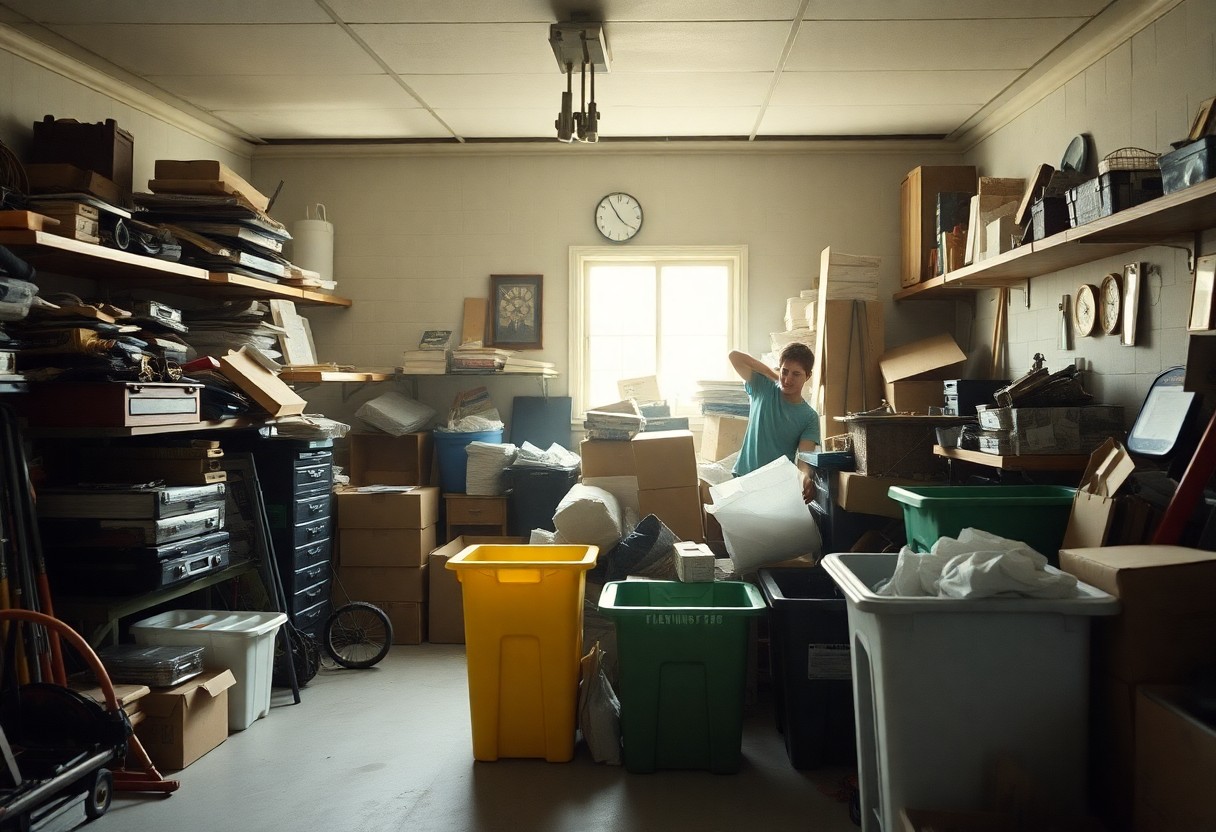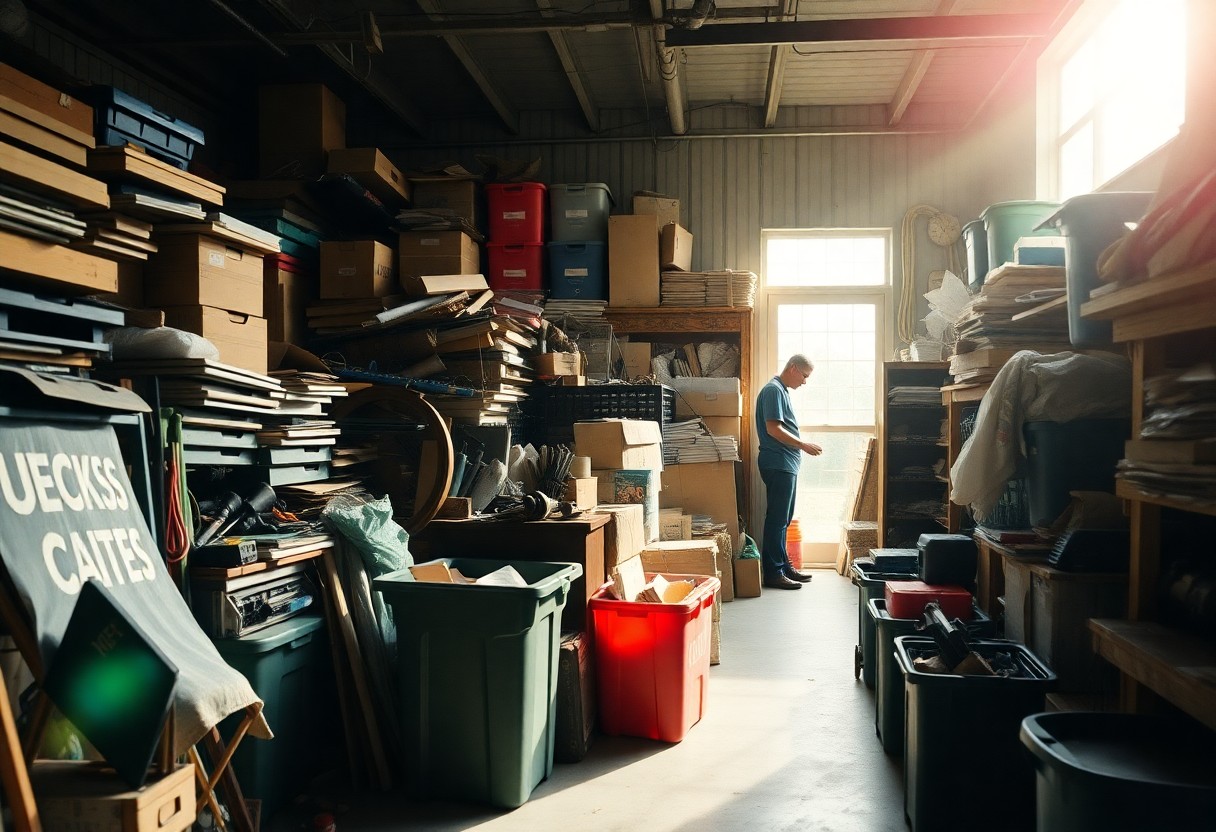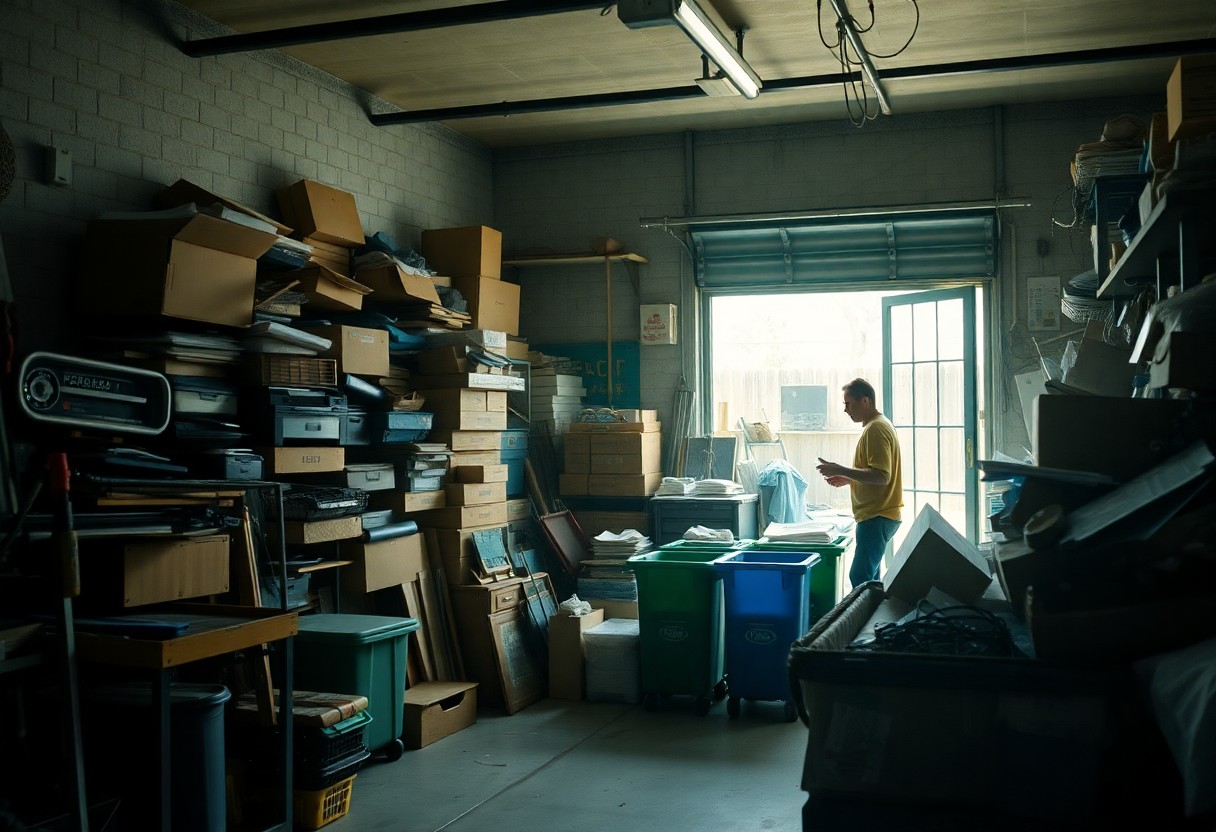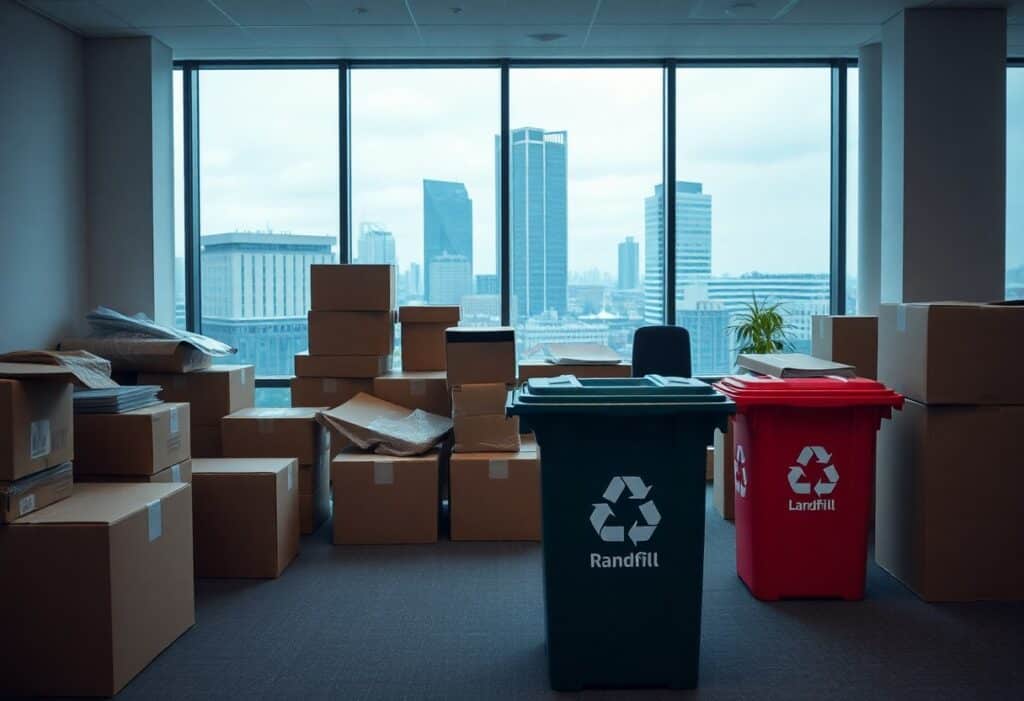You can significantly reduce the amount of waste generated during your garage clearance by following a few simple steps. Begin by sorting through your items and identifying those that can be recycled, donated, or upcycled. Items such as old tools and paint can pose health risks, so ensure proper disposal. Consider hiring a skip for easy waste removal; for expert tips, check out Tips on Hiring a Skip for a Garage Clearance. With careful planning, you can make your clearance eco-friendly and efficient.
Understanding Waste Materials
Your garage often hides a variety of waste materials, some of which can be hazardous or difficult to dispose of correctly. By understanding these materials, you can avoid mishaps during your clearance and minimise waste effectively.
Types of Waste in Garage Clearances
- General Waste – Items that cannot be recycled.
- Recyclable Waste – Paper, plastics, and metals.
- Hazardous Waste – Chemicals and batteries requiring special disposal.
- Organic Waste – Items like unkempt gardening tools.
- Electronic Waste – Old gadgets that need recycling.
Knowing the types of waste you’re dealing with will lead to better waste management strategies during your garage clearance.
Identifying Reusable vs. Non-reusable Items
Clearly, distinguishing between reusable and non-reusable items can substantially aid in your waste minimisation efforts. This involves assessing the condition and functionality of each item in your garage.
Nonreusable items typically include those that are beyond repair or have deteriorated to the point of being unsafe, like damaged tools or corroded batteries. In contrast, you should salvage usable items such as furniture, appliances, or gardening tools, which can be donated or recycled. Identifying reusable items not only helps reduce landfill waste but also promotes a positive impact on the environment. It’s imperative to handle non-reusable items responsibly, opting for proper disposal methods to ensure they do not pose a risk to health or the planet.
Tips for Minimising Waste
If you want to achieve a successful garage clearance, consider the following tips for minimising waste:
- Prioritise reusable items over disposable ones
- Repair items instead of discarding them
- Utilise biodegradable bags for collecting waste
- Organise a swap with friends or neighbours
Perceiving the impact of your choices can transform your approach to decluttering.
Create a Decluttering Plan
You should create a clear decluttering plan to streamline your garage clearance. Begin by identifying specific areas to tackle and set achievable goals. Break tasks into smaller parts, such as sorting, cleaning, and organising. Allocate time slots, and don’t hesitate to ask for help if needed. Keeping track of your progress can make the process more manageable and satisfying.
Set Up Donation and Recycling Stations
With an efficient clearance operation, it’s crucial to set up designated stations for donations and recycling. Designate a specific area in your garage or nearby where you can sort items into clearly marked boxes for recycling and donations.
Recycling plays a vital role in reducing waste and conserves valuable resources. Be sure to separate items like paper, plastics, metals, and electronics appropriately, as improper disposal can be harmful. Look for local recycling centres that accept various materials, and ensure that your donation items are in good condition, as charities rely on these to support their missions. Setting up these stations not only makes the process smoother but also helps you contribute to a more sustainable environment.
Factors to Consider Before Clearing
The process of a garage clearance requires careful planning. Consider the following factors to ensure efficient waste minimisation:
- Local regulations regarding waste disposal
- Items to salvage or sell
- Disposal methods for hazardous materials
- Time constraints for the clearance
- Potential donations to charities
Recognising these factors will guide you in achieving a more sustainable outcome.
Local Waste Disposal Regulations
You should always check your local waste disposal regulations before commencing your garage clearance. Each area has specific rules governing how you can dispose of waste, especially for hazardous materials like paint, batteries, or chemicals. Understanding these regulations helps you avoid fines and ensures that your waste is handled responsibly.
Timing Your Garage Clearance
Assuming you have the flexibility in scheduling your garage clearance, timing can significantly affect the process. Consider the days of the week when waste disposal facilities are open and the best times for charities to pick up donations.
For instance, weekends may be more convenient for you, but it’s imperative to check the opening hours of local waste disposal sites. Additionally, many charities will have specific days for collection; contacting them in advance may allow for a more seamless process. Organising your clearance after a holiday or major clean-up event in your community can also lead to increased recycling and a greater chance of donating unwanted items effectively. By planning appropriately, you ensure the clearance is both efficient and responsible.

Repurposing Garage Items
Many items in your garage may no longer serve their original purpose, but they can be easily repurposed into something functional or decorative. Consider transforming old wooden pallets into garden furniture or using unused shelving units for additional storage in other areas of your home. This approach not only reduces waste but also adds a personal touch to your space.
Upcycling Ideas
Even simple changes can create impactful upcycling ideas. For instance, old bikes can be converted into quirky garden planters, while glass jars can be used for organising small bits and bobs. Explore your creativity and see what treasures you can unearth from what is often considered junk.
Creative Storage Solutions
There’s a wealth of potential in creating innovative storage solutions to make the most of your garage space. Think vertically by adding wall-mounted shelves or using pegboards to store tools and equipment. This not only maximises your space but also keeps everything organised.
To achieve effective storage, you should consider using labelled boxes for categorising items, making it easy to find what you need. Installing clear containers can help you visually identify contents without rummaging through everything. Plus, take advantage of overhead storage racks for rarely used items, ensuring your garage remains clutter-free and safe. A well-organised garage not only enhances your efficiency but also prevents accidents caused by tripping over unorganised clutter.

Eco-friendly Disposal Methods
To ensure minimal waste during your garage clearance, consider eco-friendly disposal methods. Investigate local recycling facilities and programmes that accept various materials. Donate usable items to charities or community groups, which not only prevents waste but also supports those in need. Additionally, think about upcycling items into new creations, giving them a second life while reducing landfill impact.
Environmentally Sustainable Options
One effective way to manage waste sustainably is to explore environmentally friendly alternatives. Look for recycling options for metals, paper, and plastics. You can also reach out to local waste management services that offer eco-conscious disposal solutions and proper handling of hazardous materials.
Composting Non-recyclable Waste
While some items cannot be recycled, composting allows you to convert organic waste into valuable resources. This method helps divert waste from landfills while enriching the soil.
Composting is a practical solution for managing your non-recyclable waste. You can compost kitchen scraps, garden waste, and paper products, transforming them into nutrient-rich compost for your plants. Ensure you do not include meat, dairy, or oils in your compost, as they can attract pests and create odours. By composting effectively, you minimise waste impact and help improve the health of your garden.
Engaging Professional Help
Unlike tackling a garage clearance on your own, enlisting professional help can significantly enhance your waste management efforts. Experts are equipped with the knowledge to effectively sort and dispose of items responsibly, minimising the potential for landfill waste. You can find valuable Waste Reduction tips to guide you through the process as well.
Benefits of Hiring Clearance Services
Assuming you choose to hire clearance services, you will benefit from their expertise in sorting, recycling, and disposing of items. This not only saves you time but also ensures that hazardous materials are handled safely, reducing potential risks to your health and the environment.
Choosing the Right Service Provider
Help in selecting the right service provider can make all the difference in your garage clearance experience. Consider companies that prioritise sustainability and have a transparent waste disposal process.
Services that specialise in garage clearance should offer a comprehensive plan to sort, recycle, and responsibly dispose of your items. Look for providers that have robust qualifications and experience in minimising waste. Check for reviews and testimonials to gauge their reliability. Opt for a team that demonstrates awareness of environmental practices and has a commitment to responsible disposal methods. By choosing wisely, you ensure that your garage clearance contributes positively to local waste management efforts.
To wrap up
Hence, to minimise waste during your garage clearance, it is crucial to plan ahead and evaluate your items thoughtfully. Start by sorting possessions into keep, donate, recycle, and dispose categories, ensuring that you maximise re-use and recycling options. Utilise local charity collections and recycling centres for proper disposal of unwanted materials. Consider selling valuable items online or at car boot sales to give them a second life. By taking these steps, you will not only declutter your space but also contribute positively to the environment.
FAQ
Q: What are effective strategies to minimise waste during a garage clearance?
A: To minimise waste during a garage clearance, start by sorting items into distinct categories: keep, donate, recycle, and dispose. This method helps you make informed decisions about each item’s fate. Additionally, use reusable containers for storage instead of single-use bags or boxes, and consider repurposing items whenever possible. Having a clear plan for disposal, including locating recycling centres and charity shops, also helps reduce waste generated during the process.
Q: How can I determine what items I should keep and what to discard?
A: Begin by assessing each item’s functionality and sentimental value. Ask yourself how often you use the item and whether it serves a purpose in your current lifestyle. If an item has not been used for over a year and holds no significant value, it may be best to let it go. Keeping a ‘maybe’ box for uncertain items can also assist in making final decisions later on.
Q: What are the best practices for disposing of hazardous materials found in my garage?
A: Hazardous materials, such as paint, batteries, and chemicals, should never be thrown away in regular rubbish. Instead, check local guidelines for special disposal events or hazardous waste centres. Many local councils offer periodic collection for such materials. Always read labels for disposal instructions, and consider contacting local environmental agencies for assistance in safe disposal methods.
Q: How can I effectively donate items I no longer need while minimising waste?
A: Before donating, ensure items are in good condition and meet the donation guidelines of local charities. Many organisations will accept clothing, furniture, tools, and appliances that are functional. You can arrange for pick-up services with some charities, or simply drop off your items at their locations. Ensuring items are clean and usable increases the likelihood of their reuse, thereby minimising waste.
Q: Is there a way to recycle old items instead of throwing them away?
A: Yes, many items can be recycled instead of thrown away. Check if local recycling centres accept materials such as metal, glass, plastics, and electronics. Some local charities also have recycling programmes for specific items. Additionally, consider upcycling – turning old items into new creations or functional objects. Research local programmes that promote recycling and upcycling initiatives to contribute positively to your community.



